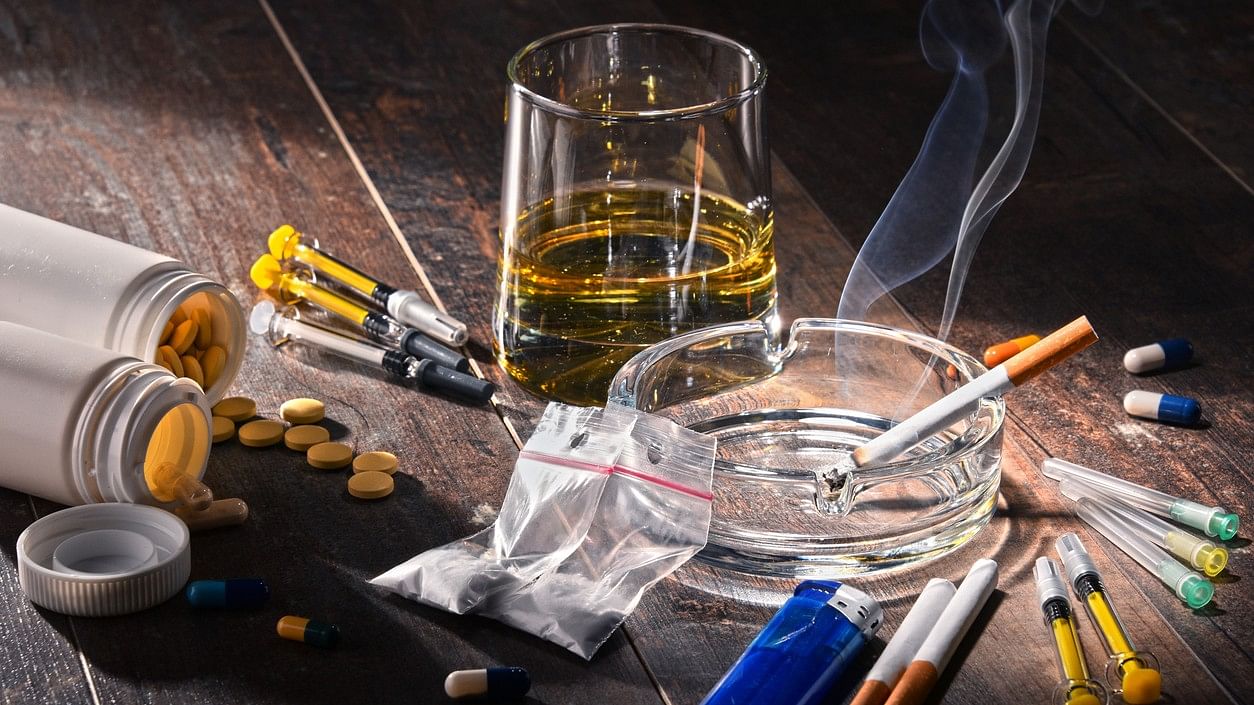
Representative image showing drugs and other addictive substances.
Credit: iStock Photo
By Sarah Green Carmichael
Elon Musk reportedly microdoses on ketamine at work; stressed-out female executives are self-medicating with psilocybin; Wall Street may be awash in stimulants. Tech executives are using psychedelics to be more creative, while traders and airline pilots rely on nicotine pouches like Zyn to stay alert. With these headlines, you’d be forgiven for thinking that everyone in a high-pressure job — or with serious ambition to climb the ladder — is now doing drugs.
Not to sound like the nun at the orgy but: None of this is a good idea. We all know the risks drugs pose. Addiction. Overdose. Long-term health problems. The possibility that what one buys on the street — or from a coworker — could be contaminated with something more dangerous.
It’s hard to get a concrete picture of drug use by professionals because, well, data on illicit drug use isn’t broken out by industry or job title. But even if the anecdote-driven reports oversell the problem, it’s clear that the “just say no” and “this is your brain on drugs” eras are a relic of the past.
“We’re in a relatively more permissive culture for use of many substances now,” says Dr Rocco Iannucci, an expert on substance use disorders at McLean Hospital, the mental health arm of Harvard Medical School. “And maybe a really stressful culture at the same time.” That’s a dangerous recipe.
Many of the professionals using illicit substances are working long hours and feel like they don’t have time to unwind, exercise, or connect with friends or family. That can fuel a desire for a quick fix to feel better, Iannucci says. Or they’re looking for something to help them keep working.
The individualism prized at the upper echelons of American business may also play a role in discouraging healthier coping mechanisms. At an organization’s highest levels, “there’s a culture of managing things on your own, going your own way, solving problems yourself or being able to power through problems,” he says. That can increase the appeal of self-medicating, as opposed to dialing back or delegating more. And Americans, in particular, associate busyness with status.
As for the executives who turn to drugs like psychedelics to improve their creativity, they may think of themselves as “biohacking,” but I see a kind of insecurity — a fear that their innate human ingenuity isn’t enough.
In this light, corporate drug use looks more like a workaholism problem masquerading as a drug problem, or perhaps a workaholism problem that has metastasized into a drug problem.
Alternatively, it’s possible that workaholism is not the cause of substance use problems, but a kind of fellow traveler. Work, drugs and alcohol — all can create a kind of white noise that muffles, but never silences, one’s inner demons. (Speaking of alcohol, it’s also worth remembering that liquor is by far the biggest problem in corporate America, even as public attention turns to novel substances.)
Successful entrepreneurs and C-suite leaders also tend to overindex on impulsivity and risk-taking, says Tomas Chamorro-Premuzic, a business psychology professor at University College London and Columbia University. It’s tough to be a visionary leader if you’re unwilling to defy the status quo. Trifling rules — like certain substances being illegal — might seem like yet more regulatory red tape to be ignored.
That’s particularly likely to be true in Silicon Valley, with its business culture that prizes velocity and daring. Facebook may have officially abandoned “move fast and break things” in 2014, but the ethos continues to have outsize influence — and not only in the tech sector.
It’s easy to see how a smart, successful person could rationalize use of illicit substances, or licit substances used illicitly (like Adderall without a prescription). Some management theorists have even suggested that, in the future, we’ll all be on substances of one kind or another at work, and that we’ll think no more about it than we do about snagging a cup of tea to overcome that post-lunch slump.
But there are serious differences, Iannucci says, between taking prescription drugs under a doctor’s care and experimenting with substances, particularly those that aren’t legal or FDA-approved, on your own.
I won’t argue for a return to the Nancy Reagan era of drug shaming. But more restraint would be healthy. CEOs and senior executives should follow the law. Expectations for hours worked should follow the human body’s natural limits. And those who want to improve their creativity and productivity should follow their doctor’s advice — not a drug dealer’s.